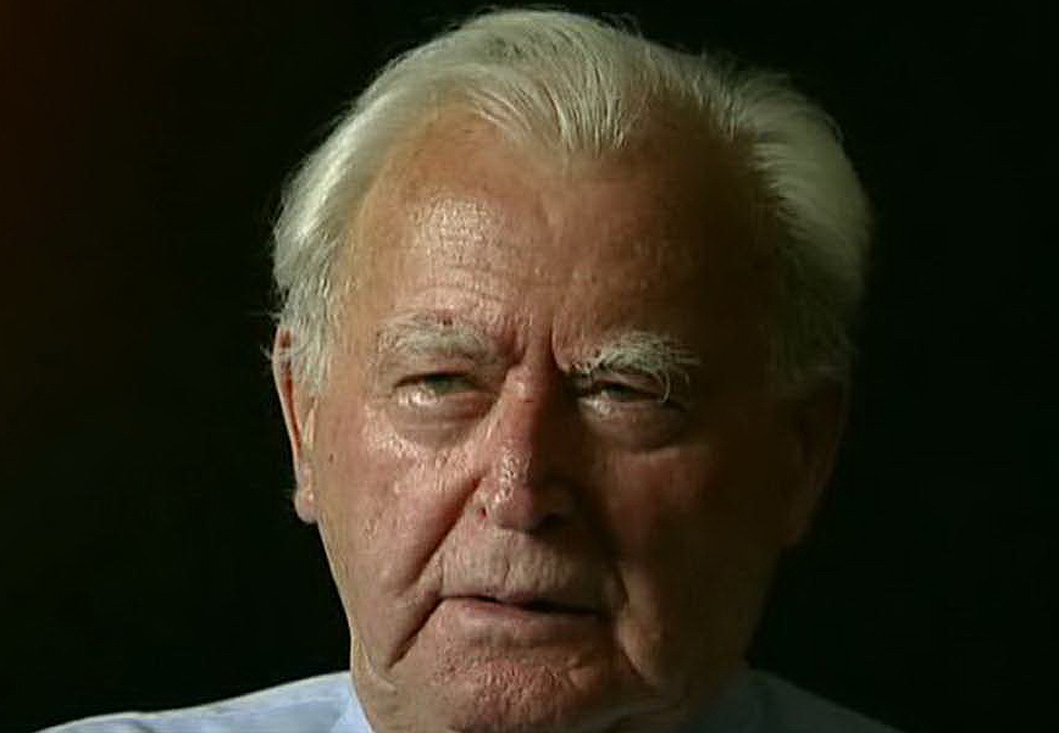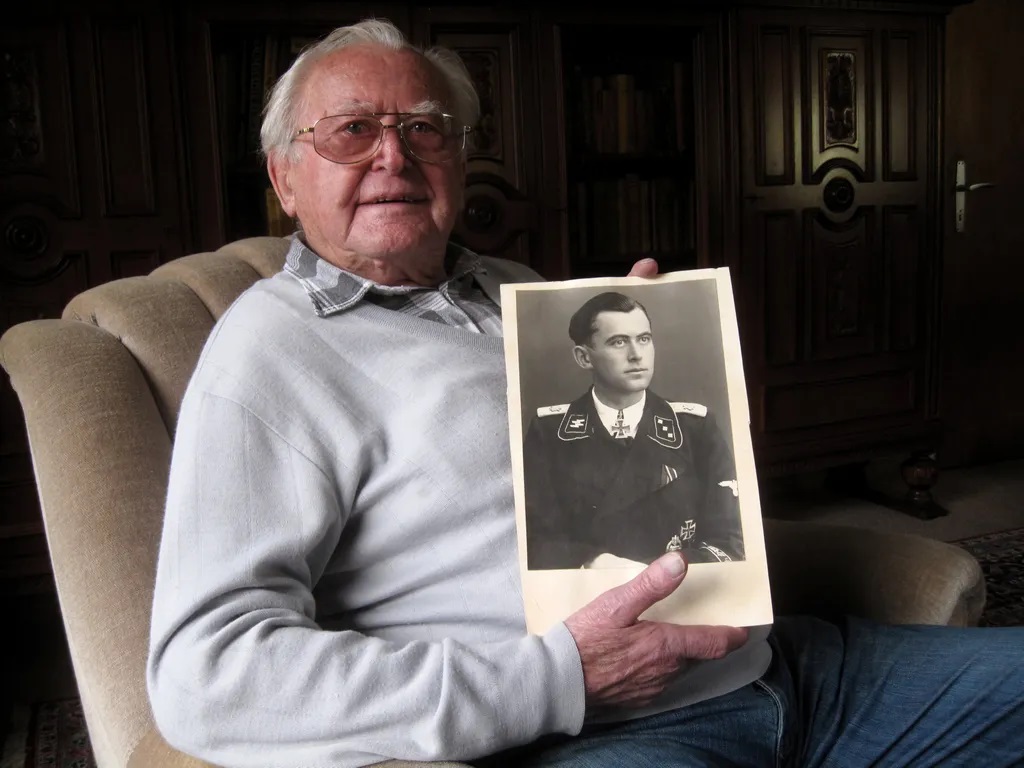Interview with Knight's Cross winner SS-Oberscharführer Kurt Sametreiter of the 1. SS-Panzerdivision 'Leibstandarte SS Adolf Hitler', Fuschl, Austria, 1989.

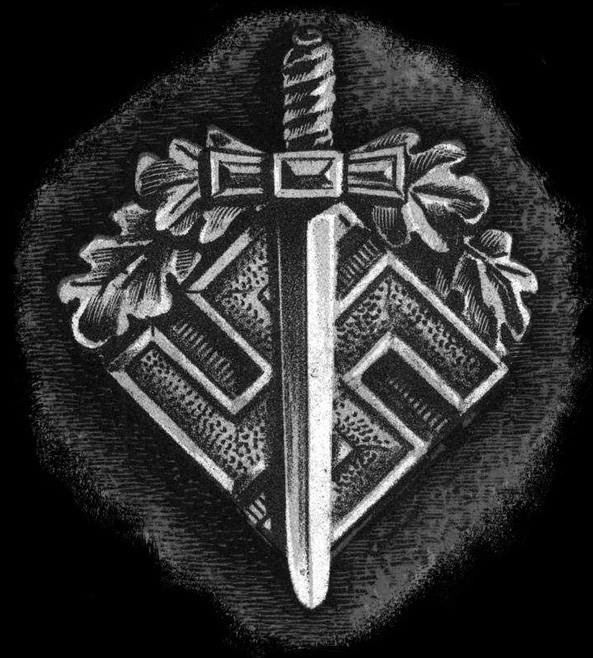
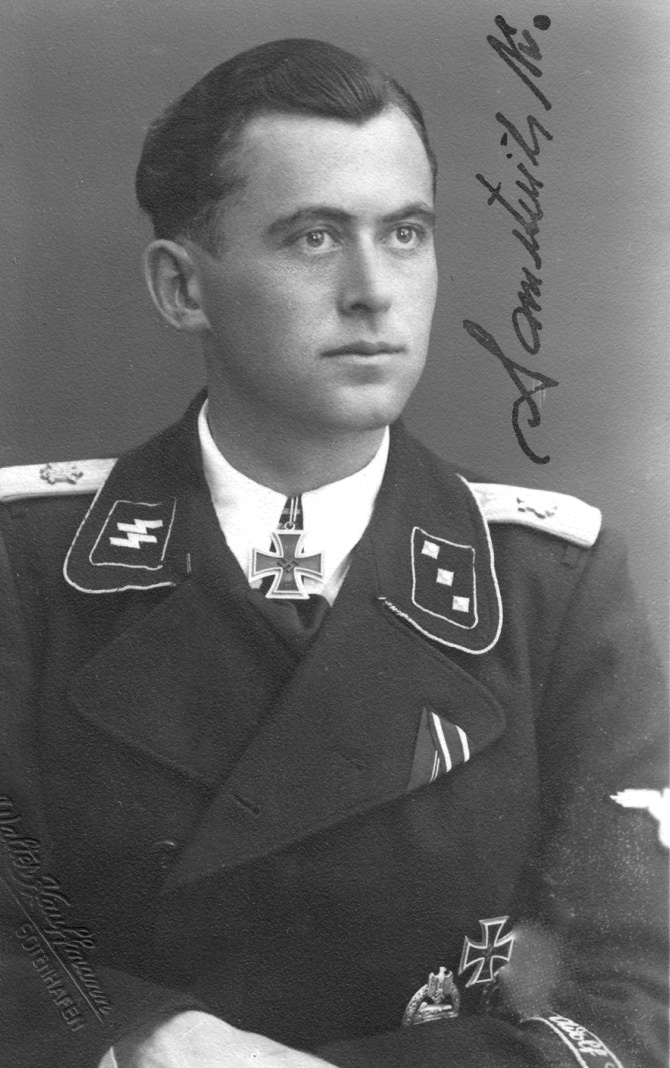
Interview with Knight's Cross winner SS-Oberscharführer Kurt Sametreiter of the 1. SS-Panzerdivision 'Leibstandarte SS Adolf Hitler', Fuschl, Austria, 1989.



Kurt: A little history first, I was born in 1922 in the Austrian Alps and my
father worked for the railroad, building tunnels. We grew up with not a lot of
money, but always found a way to stay fed. I got lucky and was picked to be
a ball boy at a tennis club, so that helped. In 1938 Austria decided to join
with Germany, which almost all Austrians supported. Hitler revived
Germany again and we knew he would do the same for us, our economy was
not good under our current leaders.
So how did I come to the SS? One of the first things to happen was
recruitment for the German Wehrmacht and SS. I was an adventurous spirit
and was impressed by the recruiting literature that the SS handed out. The SS
was a very hard branch to get into and I was afraid they would not take me,
as many boys in my area were turned away. They were known to be an elite
group of men, the best of the best.
To my surprise I was accepted and told I needed to be fattened up
a bit, as I was undernourished. This started my adventure. I was on a train to
Dachau to the new SS barracks, which still had that fresh paint and wood
smell. I was accepted in the SS-Totenkopf Standarte 1 'Oberbayern'.
Dachau was a concentration camp, did you see the prisoners or have any
interaction with them?
Kurt: Yes, the prisoners were assigned work details around the area to clean
and maintain the barracks. We would oftentimes work alongside them to do
details. We had to clean the steps and mop daily to make sure the barracks
were ready for inspection at any time. We were told not to give the prisoners
anything, but many would share cigarettes and tobacco. I never saw any
abuse or mistreatment of anyone. No prisoners ever complained to us about
their treatment.
I saw quite the opposite; prisoners seemed very relaxed and happy.
There would be celebrations in the camp when a prisoner was due to be
released, the commander even allowed them to have alcohol, although it was
a very small portion. We were jealous, as we were not allowed any, since we
were in training. I find the photos and stories shown after the war hard to believe, the prisoners seemed very well taken care of and were not bothered
in any way, many even roamed free to do their details.
What was your training like?
Kurt: It started out easy, with learning to march, lots of exercise like running
and relays, and inspections. Later on it moved to training with weapons, first
pistols, then the K98 rifle, then machine guns. I remember one time a recruit
was watching a group of women workers and the instructor saw him, he ran
up to him and told him since he did not want to participate with us, to go with
the women. He did that and their leader made him march back to us, and then
run around the barracks three times. He learned to pay attention after this.
One thing I want to mention is how different the SS was compared
to the army; our officers trained with us and did the same tasks as us. This
way it showed they were part of us and could do our same tasks. The SS had
leadership, but no class structure of officer versus enlisted. We were all in
this thing together, which paid off on the field of battle; we were trained to
work as a united team.
As newly minted recruits, we were chosen to participate in the 1938
party congress, which was a huge honor. My only gripe was it was very hot
in our new black uniforms, with full kit; I sweated like crazy. We had special
training by doctors on how to stay at attention, or parade rest [a formal position assumed by a soldier in ranks in which he remains silent and motionless...] without passing
out. There were water stands everywhere to keep everyone hydrated, there
were tens of thousands of participants on each day.
Some even got into the many lakes surrounding the area. Nuremberg
was a great town with very friendly inhabitants. We had a camp set up and
invited many of the girls to drinks and dancing. Our officers stayed right with
us and drank and danced like everyone else. After this was over, I was
transferred to a Panzerjäger company where I learned to use the Pak36 gun and learned tactics to hunt tanks.
[Above: A gorgeous rendition of a Liebstandarte knight by battlefield artist SS-Oberscharführer Ernst Krause. Click to enlarge.]
You mentioned you were part of the union with Czechoslovakia, how did the
people view you?
Kurt: Yes, my unit was part of the German force to move into the area. The
people largely welcomed us, there was no shooting, we had been instructed
to make a good impression and to not make the people feel like we occupied
them. We had recruiters with us, who set about trying to recruit from the
Czech army and civilians. Many of the civilians brought us water and treats,
which was welcomed; these were called 'flower campaigns', as we wanted to
win the hearts of the people, not to conquer them.
This was a short-lived action, we stayed in barracks and worked
with the army to ensure a smooth transfer of authority. We mainly went out
and spoke with people to show them we were here as friends. Warmongers
had told the people we were here for a fight, and nothing was further from
the truth. A new leader took command and was pro-German [Emil Hácha (July 12, 1872 – June 27, 1945)], the people
responded very well.
You served in Poland with SS-Heimwehr 'Danzig'?
Kurt: Yes, after moving back to Dachau, we did more training and then
received orders to report for a vacation up north. We were on a big cruise
ship and enjoyed all the amenities. Once we were by Danzig all the fun
stopped and we had to go back to military drills and shooting exercises. The
day the war began we joined other Danzig units and occupied key offices.
Most Poles wanted nothing to do with the war.
Some of the war lovers had secretly fortified buildings and stashed
weapons for an uprising. The Polish plan was to make Danzig Polish; they
had tried to push the German majority out by putting Poles in key positions to
help an uprising. Our men had small problems getting them out of the post
office; they also had fortified Westerplatte [a peninsula located on the Baltic Sea], which was against the treaty.
I briefly was part of the home defense to take this island.
The Poles
were dug in and had cannon, machine guns, and mortars. We only had rifles,
pistols, and a few light machine guns. The Luftwaffe had to help to break down the
strong bunkers. Even having a battle cruiser did not help that much, but when
they surrendered, they were treated very well even though they fought a
senseless battle and caused needless loses.
My unit also had sporadic fights into Poland, guarding a bridge so
it would not be destroyed, and rounding up the scattered Polish forces who
refused to surrender earlier. These men proved to be quite nasty and fought
more like bandits than soldiers. I will say that the Polish people had no taste
for war, and either stayed in their homes, or at best came out to watch us. The
German minority was very happy to see us and greeted us as liberators
bringing us flowers, food and drink.
After the Polish campaign, we were joined into the 'Totenkopf'
Division and received cuff titles. We met with our NCOs and officers and
they covered our performance in battle and graded each of us. I received good
marks, but not high. We were still very green.
You then fought in France, what happened and how were your relations with
the civilians?
Kurt: Yes, 'Totenkopf' was involved as a reserve division; we entered through
Holland, then Belgium, and finally France. We didn't see any action until we
met the English and French at Arras [France]. The English tore through our lightly
defended lines. Rommel had the idea of using flak guns to stop them as our
Pak36 were useless against the heavier armor. Rounds just bounced off,
one could see this, and it was unnerving.
The English gave us a fight, we had many new, young recruits and
they broke easy, or ran away. I saw my first English prisoners and met with
them to talk about the war, and share photos of home. I found them to be very
proper and just like us; we said it was a shame to meet this way. This battle
also had a dark side to it as well. We saw evidence of civilians who had been
shot down, we were told they were German sympathizers and shot by their
own army. Rumor spread too that wounded German pilots had been
executed and murdered by civilians. Parts of the infantry regiment was fired
on by reversed bullets [a German anti-tank method for penetrating armor] and suffered needless wounds, which cause painful
deaths. The English had some fanatics who really believed in the war and
winning any way they could; so is the curse of war.
These instances cause a reaction that was unfortunate; the 'Totenkopf'
Division is accused of killing prisoners, civilians, and African soldiers. I know
some French women claimed African soldiers raped them, so any guilty man
was executed. French police were brought in to help investigate. It was said
two young soldiers shot down English prisoners, but no one I knew saw this
personally, it was not known until after the war, so I am skeptical. Some
civilians were executed for crimes and were tried by French helpers.
For the most part the civilians behaved, just like in Poland, and only
came out if they needed our help or were just curious. One of our doctors helped a
child, and we went out of our way to keep civilians away from our columns,
so they would not be strafed. Luckily our Luftwaffe controlled the skies most
days. We pushed the English back to Dunkirk and then received orders to
halt. We were puzzled by this, rumors were everywhere that the Führer
wanted them to just leave, Göring wanted the Luftwaffe to get credit, or the
general staff lost its nerves. Today it is safe to say the Führer was extending
an olive branch.
We were moved down south by Spain when word of the surrender
was received, we celebrated. During the stay I was transferred to the LAH [Leibstandarte Adolf Hitler] since I had tank hunting training and they were building into a division. I was
sent to Metz, just in time to start more training and was greeted by Sepp
Dietrich.
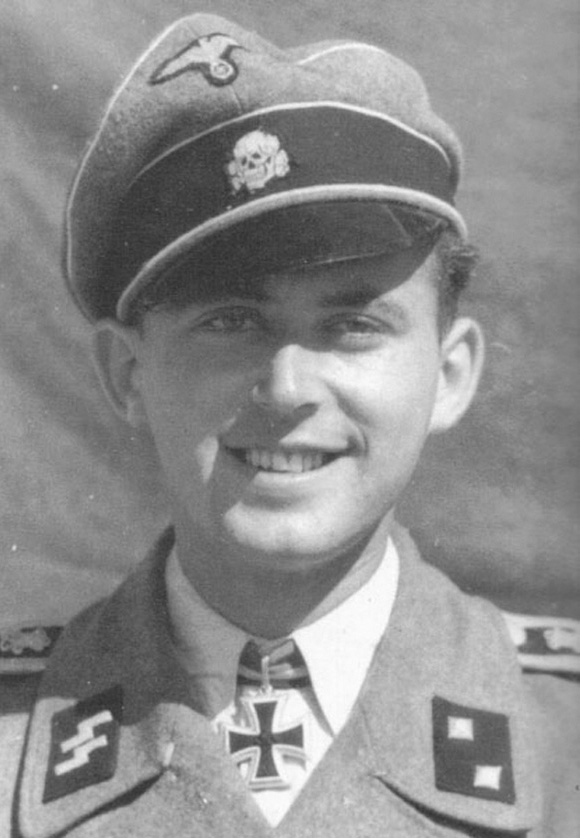
[Above: Kurt Sametreiter.]
You said you fought with the LAH in the Balkans?
Kurt: This campaign was quick for the division. We did not see much fighting
until we hit the Klidi Pass [Battle of Vevi in Greece], then the English put up a fight. They made stands
on the tight roads, but we became good at enveloping them. We had learned
to become better shots and knocked out their vehicles and strong points with
ease. I saw many prisoners, and we allowed them to ride with us while we
talked about home and girlfriends. We went out of our way to take them
prisoner, often times at our own peril. We viewed them as brothers; the
Greeks welcomed us as friends, not as enemies.
What was the war with Russia like and why did Germany attack?
Kurt: The last part first, history is not always correct, especially when
dishonest people write the history. Russia was very clear it wanted a world
revolution and demonstrated it would use force to enforce this plan. The
Führer used politics to keep Russia at bay, but it was going to come to war
at some point. We attacked them before they attacked us, it is evident to me
due to the vast amount of men and material we captured. I saw the huge
stockpiles of ammunition, equipment, and aircraft. We even took maps off
prisoners detailing routes through west Poland and the Reich. Germany made a
defensive attack to break up a planned attack on us; our aim was to save
Europe from Bolshevism, not to take living space.
The LAH went into Russia not a full division, and the going was
tough, we lacked fuel and ammunition, which angered our leaders. Orders
were sent out to conserve everything. This is where some men started using
captured Russian weapons, as there was plenty of ammo. I remember it was
hot and dusty; the roads were not like Europe, they were full of ruts, which
slowed us down. We were miserable, then winter hit.
It might surprise you to know that the vast majority of Russians
welcomed us as their liberators. They hated Stalin and the regime that ruled
over them. The LAH came upon prisons where the NKVD had shot all the
inmates who were political. That winter the Russians put the whole front into
retreat due to massive counter-attacks. It was during the winter that my unit
was upgraded with mounted anti-tank guns, and we had immediate success.
We were sent to France in the summer and had a large parade with
throngs of people watching. At this time, we were built into a full armored
division, and put on alert against Allied landings. We trained on our new
weapons and felt very confident we could take on superior tanks. We had
gained a lot confidence fighting, and were seen as a very mobile, elite
division. The LAH ended up back on the Eastern Front just in time for
Kharkov. It was here my gun was hit after knocking out Russian tanks, I was the only survivor, and luck favored me as I was in an open area, but I was
wounded and sent home to recover.
How did you win the Knight's Cross?
Kurt: It was during Kursk, I was still with the tank hunter battalion. I had a
very good crew, and in one day we knocked out 24 tanks. They attacked our
small force with 40 tanks. It was a blood bath for the Russians; we mowed
them down and suffered very few losses. This was the battle of Kursk, we
could have won this, as we had penetrated deeply into their lines, and we
were forcing their reserves to be committed. The field was littered with
Russian tanks, not German. They outnumbered us heavily, but we were better
shots. They knew we were coming, and still could not stop us.
The Führer had traitors who were advising him and talked him into
withdrawing when victory was close. We were pulled out and sent to Italy to
disarm the Italians. However, I was sent home due to being awarded the Knight's Cross.
I got to see my parents, and gifts came in from all over. I met our Gauleiter,
as was customary, but I wanted to stay at home to see friends and family. I
was in the newspapers, which I thought was too much, everyone wanted to
hear about our battles, which I did not want to talk about. I then had to hurry
to meet my regiment in Italy and got into some trouble along the way by
having too much fun; I was put under a curfew for a few days while others
mingled with Italian girls. We had a good relationship with the people
wherever we went, lots of dinners, dances, and parties, when we could.
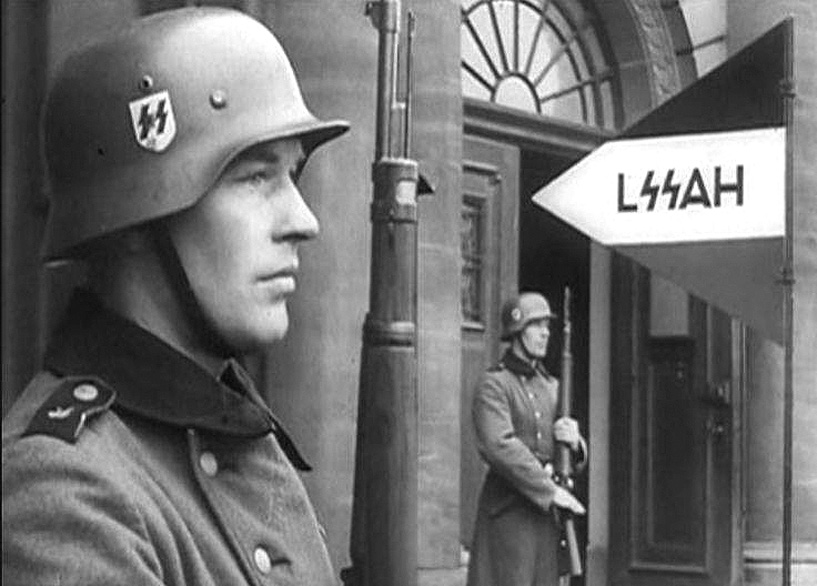
[Above: Noble knights of the Liebstandarte SS Adolf Hitler guarding a recruiting office.]
So you believe Germany could have won Kursk?
Kurt: Yes I do, our Korps had pushed deep into the Russian defenses, and
had knocked out much of their armor, while ours was mostly intact. Our kill
ratios were ridiculous; I have heard that for every German Panzer lost, 15
Russian tanks were lost. From the view of the battlefield, I would believe
this. We had very few Tigers, Panthers, or heavy Panzer IVs but this small
force, along with the anti-tank units, terrorized the Russians. We took many
prisoners who seemed at their rope's end, utterly exhausted.
What about all the claims of war crimes committed by the LAH and Waffen-SS in general?
Kurt: I cannot speak for other divisions, but the LAH will stand blameless.
War is a dirty affair, and it is easy to be caught up with rage. Some soldiers
can witness cruelty and then become cruel themselves. I saw this once through binoculars; Russian soldiers were seen shooting a peasant family
who allowed Germans to stay in a barn. The hamlet was attacked and
captured, and as soon as the Russian platoon surrendered, they were all shot
down since they killed the civilians.
This is the legacy of the German conduct of the war; we were at the
receiving end of very cruel deeds by our enemies, and when we in turn
responded, the victors turned these into war crimes. I suspect it was the same
for every accused German unit, a reaction to an action that was justified under
German or international law, but the victors changed the laws in order to
prosecute our men but shield themselves for the very same acts.
I will share with you an example of how our relations with civilians
went. My [motorized] gun accidently ran over a horse, the owner was not paying
attention, and trying to hog the road. We were disciplined for hitting the
horse, we had to pay out of pocket to buy a better horse and apologize.
Another example: one of our men stole two eggs and received punishment
and had to pay the equivalent of a dozen eggs to the farmer. He had no money,
so he had to give the farmer a watch he bought in Paris.
My point is, we had very strict orders to treat civilians with respect
and good will. Many German men had sexual relations with the women of
other countries, I looked down on this as many were married, and it went
against how we were taught to behave, but I suppose the stress of battle had
to be tamed.
What was the end of the war like for you?
Kurt: I was transferred to 'Nederland' and used in the east as a rear-guard force and we
caused the Russians losses. We kept retreating until we came to the
Americans who took us prisoner. A Jewish officer who was surprisingly nice
to me, interrogated me. He knew I was an SS officer and put me to work as a
mechanic in the motor pool. So many of my comrades were not treated this
way and were persecuted after the war. Even the black soldiers were kind to
me and left me with a good impression. I was a very lucky one, but others in
my family were not. I know many women who were raped, and the men sent
away for the smallest infractions. Being a party member was certain death if
the partisans or Russians got you.
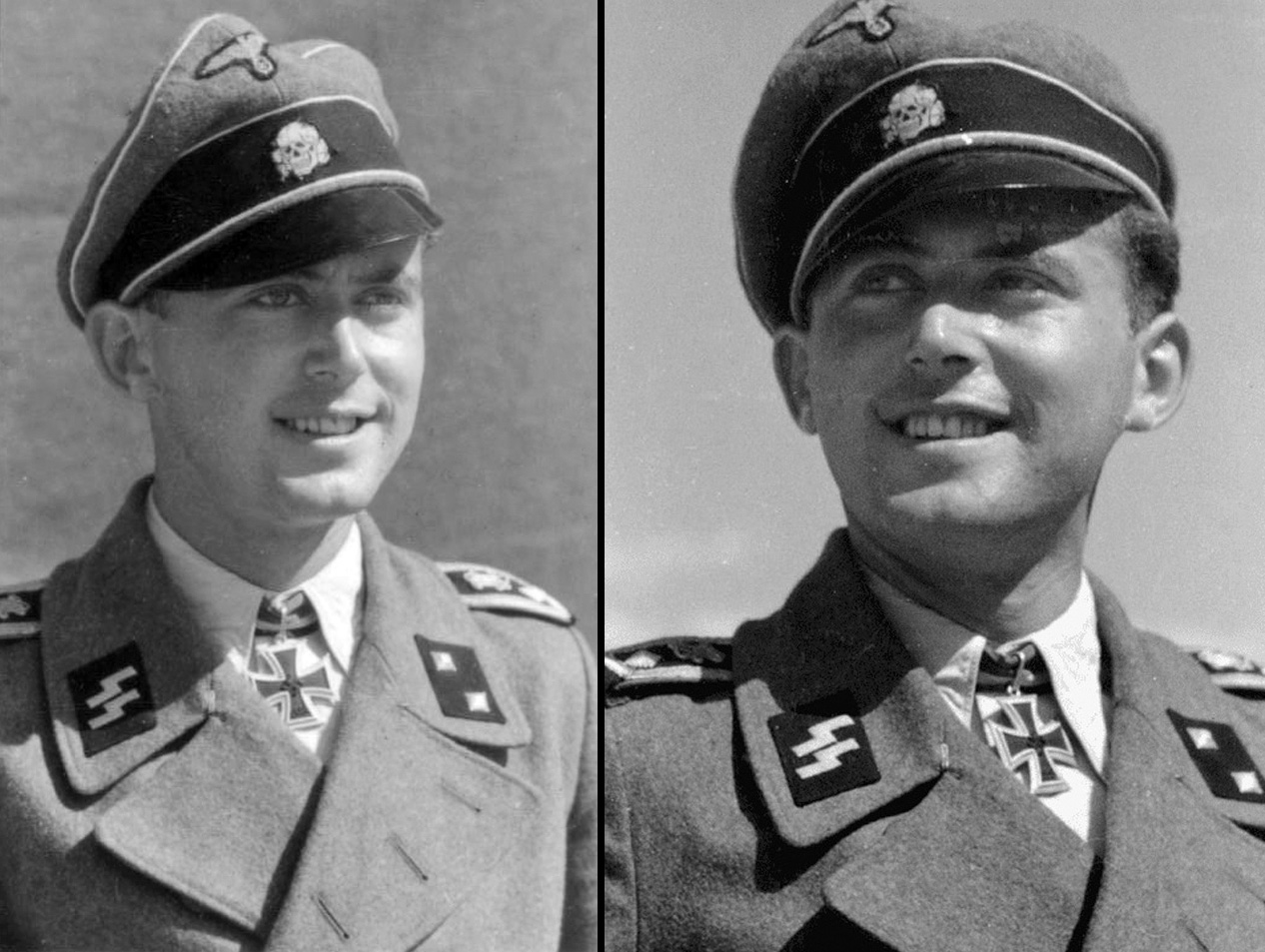
[Above: Kurt Sametreiter.]

Kurt Sametreiter's Knight's Cross recommendation:
'On the 11.07.1943, SS-Oberscharführer Sametreiter was with his Zug and the II./SS-Pz.Gren.Rgt. 1 LSSAH in the attack on Swch. Stalinks and forest located south of there. During a night battle they threw the enemy out of Sowchose.
On the 12.07.1943 at 06:30 hours the enemy advanced out of Jamki and Storostrowoje with around 40 tanks and supporting infantry, and these counter attacked Sowchose Stalinks and Hill 245.9. SS-Oberscharführer and Zugführer Sametreiter, with 4 of his self-propelled 7.5cm guns, was able to prevent an enemy breakthrough through his determined leadership. Making his own decision, Sametreiter went with his Platoon past our outermost infantry line and out towards the enemy tanks, continuously shooting at them for over an hour. In the end he and his platoon destroyed a total of 24 enemy tanks. All of his Platoon then shot at the enemy infantry with their high-explosive rounds and this caused them to retreat.
After they had fired all of their shells, he gave the order for his vehicles to drive against the enemy infantry and give further cover to our own men. It is due to his determined leadership that the tank attack was defeated. The Platoon of Sametreiter gave combat covering fire to the men.'
[Above: Kurt Sametreiter, the old warrior, long in his years.]
[Above: Kurt Sametreiter.]
